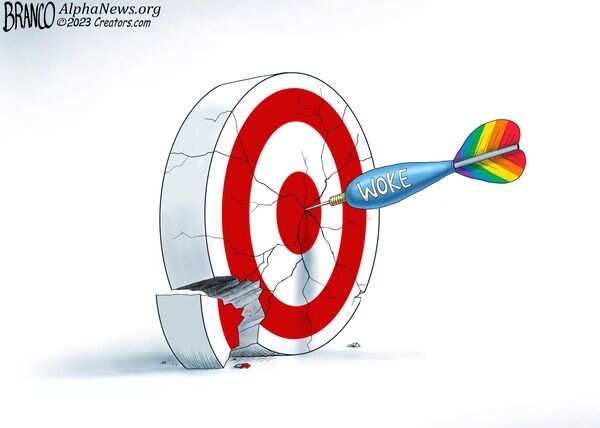
It seems that retailers, entertainers, manufacturers, and athletes never learn their lessons when it comes to voicing their opinions in a public arena.
Just ask Colin Kaepernick, whose refusal to stand for the national anthem started a firestorm of controversy in the all-American sport of football, or Nike who decided to embrace his views by featuring him in ad campaigns.
More recently, Bud Light lost its parent company Anheuser-Busch an estimated $6 billion in the first week after its partnership with transgender influencer Dylan Mulvaney, and Disney continues to bleed followers after its blatant attempts at diversity, equity, and inclusion in kids’ movies.
In a world where people just want to follow sports, watch family movies, drink beer, and purchase goods from retailers, it seems progressives are hell-bent on furthering their agendas on a public stage. Despite the damage caused to the bottom line and backlash from an outraged public, liberals continue to spotlight unpopular views in places, goods, and services that should remain neutral in the interest of profit margins.
Even major cable and streaming carriers such as DirecTV didn’t get the memo and lost billions after it canceled the conservative channel Newsmax from its platform in late January of 2023, following the urging of prominent Democratic leaders to remove the channel because of “misinformation.” The move cost DirecTV an estimated $10 billion dollars in lost subscribers, a loss that played a role in restoring the channel to the provider’s lineup in March.
Mega retailer Target seems poised to plummet in the stock market as Keira Fernandez, a Chief Diversity & Inclusion Officer at Target, turns the heat up on Target’s Racial Equity Action and Change. The task force promises to increase the hiring of Black employees, despite the racial balance of 50/50 minority and white employees. Not content with this, Fernandez recently pointed out that white women needed to play a bigger role in calling out what she perceives as “transgressions” committed against Blacks in America.
“I think the number one thing that I would encourage White women to do is take the [DEI] learnings… and use your voice… so the woman of color in the room doesn’t always have to,” Fernandez declared.
This misstep is coming hard on the heels of recent troubles following Target’s decision to remove LGBTQ products from some southern stores. The products were removed following complaints from conservative groups within the states and were products that were placed in the stores because of complaints from LGBTQ supporters regarding the lack of products.
As if Target wasn’t embedded in controversy deeply enough already, its decision to use transgender designer Erik Carnell for a gay-pride line of clothing and bags backfired when occult designs on his independent web store were uncovered, featuring taglines such as “Satan respects pronouns.” A best-seller on his site is a pin with a guillotine labeled “Homophobe Headrest.”
Target was in the hot seat again in May after allegations that its “tuck friendly” bathing suits were being created for children, a claim that was found to be untrue following a deeper investigation.
All these controversies should have been enough, but Target’s over-the-top Chief DEI officer decided to push the polarizing and controversial topic of “systemic racism” one step further.
“[Target’s] tolerance for intolerance will definitely be a significant challenge to any company that’s thinking about how they build a culture. It was talking about culture like that’s so deeply woven in your strategy,” Fernandez says.
“Because whether it’s right or not… there are places that you and I will go where your voice will be heard differently than mine. And that is why we’re doing this work. That’s why it’s so important to have this conversation,” she observes. “But we also can’t ignore the systemic history that got us here and then the things that we have to do differently to remove those barriers.”
Things like hiring a workforce that is more than 50% Black and ordering employees who don’t agree with the LGBTQ movement to quit, apparently.
Meanwhile, Wal-Mart’s only recent transgression appears to be its reliance on self-checkout stands, a move that has people divided down the middle. Some complain that scanning an item is too difficult and requires specialized rocket-science training, others love the convenience of not having to stand in line for the one or two open checkout lanes, and all hate the security guards posted at exits to ensure everything has been paid for before leaving the stores.
While Wal-Mart has been the subject of racial profiling and gender discrimination suits in the past, it has managed to skate large-scale, widespread social and political issues in the present. If Wal-Mart continues to provide unbiased service to its customers, it may be poised to defeat Target and absorb its unhappy customers, making it the last giant retailer standing.
Only time will tell if the back-to-back controversies affect Target’s bottom line, and it will be interesting to see if Wal-Mart can figure out a middle ground to pull these disenfranchised customers away from its biggest competitor.
Starting, perhaps, with staying quiet on political and social issues and just selling products.















